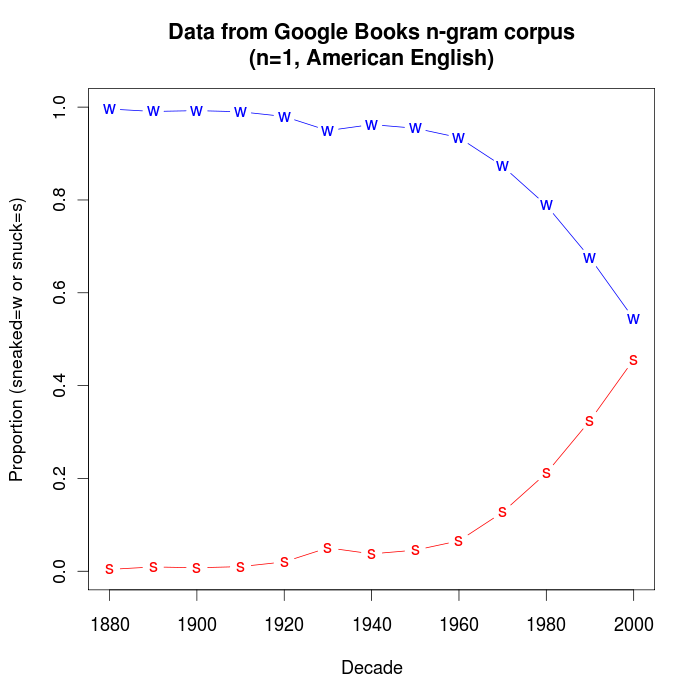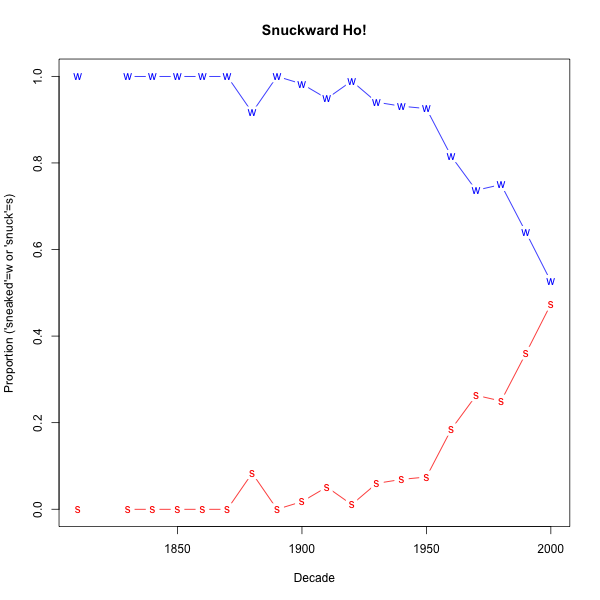Replicating the snuckward trend
« previous post | next post »
In yesterday's post "Deceptively valuable", I made use of counts from the Google Books ngram dataset, as seen through Mark Davies' convenient interface. That was a case where the ngram dataset's flaws (uncertain metadata, lack of ability to look at context, etc.) are more than balanced by its virtues. In thinking about some of the other issues involved, I remembered a case that makes it possible to check the ngram dataset's answers against those given by another historical collection: the trend over the past century for Americans to replace "sneaked" with "snuck".
Here's the result of tracking this trend in the Google Books dataset:
In "Graphically snuckward", 6/19/2010, I created a similar plot from Mark Davies' COHA corpus:
For a discussion of some of the linguistic and cultural issues involved, see Stan Carey, "'Snuck' sneaked in", Sentence First 6/18/2010.


Adam said,
October 17, 2011 @ 7:08 am
Strong verbs rule. ;-)
h.s. gudnason said,
October 17, 2011 @ 8:59 am
@Adam, But weak ones obviously role in the past!
GeorgeW said,
October 17, 2011 @ 9:09 am
According to MWCD: "From its earliest appearance in print in the late 19th century as a dialectal and probably uneducated form, the past and past participle snuck has risen to the status of standard and to approximate equality with sneaked. Indications are that it is continuing to grow in frequency."
I think I have always (Southern AmE, age 70) had an aversion to 'snuck' probably because, at least unconsciously, of its stigma as an "uneducated form."
greg said,
October 17, 2011 @ 11:10 am
My personal theory on "snuck" has something to do with the Grinch, which appeared in 1957, and the TV version, 1966. Although I'm too lazy right now to find the source material, I can't think of "snuck" without picturing the Grinch… and the "sneaked/snuck" divide sure does take a leap between 1950 and 1970. Stink, Stank, Stunk!
Faldone said,
October 17, 2011 @ 11:37 am
Etymonline (http://www.etymonline.com/index.php?allowed_in_frame=0&search=sneak&searchmode=term) seems to relate it to the OE snican, which was a strong verb. I think this should have given us snike, snoke, ?snick(en), but still it was a strong verb.
Adam said,
October 17, 2011 @ 3:14 pm
@h.s. gudnason
Ha! Is it rule, role, rolen, or rule, role, rulen?
H.s. Gudnason said,
October 17, 2011 @ 3:17 pm
@Adam. The Former.
Skullturf said,
October 17, 2011 @ 6:50 pm
The "sneaked"/"snuck" question came up somewhat recently when Jennifer Garner was a guest on Conan O'Brien's show.
http://www.youtube.com/watch?v=q51ld-scMI8
Tom said,
October 18, 2011 @ 12:37 pm
Some credit (or whatever) to the great (and grammatically colorful) baseball announcer Dizzy Dean,who (my memory tells me) used snuck ("He snuck back into first") and slud ("He slud into third.")
LDavidH said,
October 19, 2011 @ 2:18 am
Didn't Forrest Gump also use it – maybe that helped "popularise" it? Or was that too late to be relevant?
This Week’s Language Blog Roundup | Wordnik ~ all the words said,
October 21, 2011 @ 10:41 am
[…] for snow” myth; and Julie Sedivy was lukewarm about warm soda. Mark Liberman compared data on snuck versus sneaked, and delved into the Dire, Ne pas dire ("Say, Don't Say") feature of the […]
» Snuckward Ho! The Blue Candle Society said,
October 27, 2011 @ 7:38 pm
[…] been a week alternately stressful and just plain busy, so I'm copping out with another Language Log Link (or a triple-L, as well call it in the blogging […]
“Snuck” sneaked in « Sentence first said,
November 28, 2011 @ 1:26 pm
[…] also Liberman's corpus analysis of snuck vs. sneaked in different contexts, and a follow-up post that shows Google Books "replicating the snuckward trend" in American […]
Joe Gallagher said,
December 10, 2011 @ 2:17 pm
I will accept "snuck" only when the past tense of peak becomes "puck".
pjharvey said,
October 25, 2012 @ 7:10 am
I don't know if this is the best place to post this, or if it is entirely relevant, but:
'A more paranoid ship, the Caconym thought, would almost feel like it had been getting snuck up on.' –Iain M. Banks, The Hydrogen Sonata, p.61.